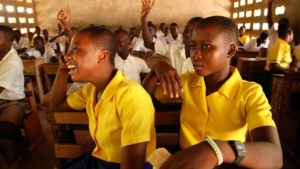The Impact of the Girls’ Education Challenge in Ghana
 In Ghana, digital literacy has become essential for students aiming to thrive in the modern workforce. However, girls in rural areas face particular challenges in accessing digital tools, often due to economic barriers and traditional gender roles. Recognizing this gap, the U.K.’s Foreign, Commonwealth and Development Office (FCDO), through the Girls’ Education Challenge (GEC), has partnered with local nongovernmental organizations (NGOs) to empower girls in rural Ghana. Programs like the Discovery Project, implemented by Impact(Ed) International, alongside Worldreader, equip young girls with digital literacy skills to help them succeed in school and beyond.
In Ghana, digital literacy has become essential for students aiming to thrive in the modern workforce. However, girls in rural areas face particular challenges in accessing digital tools, often due to economic barriers and traditional gender roles. Recognizing this gap, the U.K.’s Foreign, Commonwealth and Development Office (FCDO), through the Girls’ Education Challenge (GEC), has partnered with local nongovernmental organizations (NGOs) to empower girls in rural Ghana. Programs like the Discovery Project, implemented by Impact(Ed) International, alongside Worldreader, equip young girls with digital literacy skills to help them succeed in school and beyond.
The Digital Divide in Rural Ghana
In rural Ghana, the digital divide poses a significant barrier to girls’ education, limiting their future career opportunities. Girls often have less access to technology than boys due to household responsibilities and cultural expectations. This gap restricts their learning opportunities and potential to gain the digital skills essential for today’s job market. Targeted interventions focused on girls’ digital literacy are crucial to breaking this cycle and empowering girls to overcome these barriers.
How GEC Is Bridging the Gap
The GEC, managed by FCDO, supports education initiatives specifically designed to improve access and outcomes for girls in rural areas. The GEC provides digital resources such as tablets, e-books and online learning platforms through projects like the Discovery Project. By focusing on girls’ education, the project seeks to close the digital divide, equipping young girls with the tools and confidence to participate fully in a technology-driven economy.
Partnerships With Local and International NGOs
U.K. Aid collaborates with organizations like Impact(Ed) International and Worldreader to bring digital literacy tools to rural Ghanaian schools. Impact(Ed) International, formerly Discovery Learning Alliance, provides digital educational content and teacher training to improve digital literacy in rural Ghana. Through the Discovery Project, supported by U.K. Aid, the nonprofit empowers girls with literacy, numeracy and life skills while providing access to digital learning resources. It focuses on gender-inclusive education, reaching thousands of girls across rural Ghana.
Similarly, Worldreader’s partnership with FCDO has expanded access to reading materials for girls through e-readers loaded with educational content in local languages. These digital libraries are especially impactful in rural regions with limited access to books.
Transforming Lives Through Digital Literacy
The Discovery Project in northern Ghana has successfully empowered girls with digital literacy skills. Since its inception, the project has reached more than 104,000 girls and established 448 Girls’ Clubs across 800 schools in 11 districts. These Girls’ Clubs provide a safe environment for girls to develop literacy, numeracy and life skills while building their confidence and ambition. Through engaging content like the “My Better World” video series, which features relatable role models, the project encourages girls to envision a future beyond traditional roles.
Evaluations of the program revealed a 3.7-point increase in self-efficacy among participating girls, who reported greater confidence, better classroom participation and stronger peer relationships. Digital literacy is more than just an educational tool—it’s a pathway out of poverty. By equipping young girls in rural Ghana with digital skills, U.K. Aid programs prepare a generation for modern careers. This empowerment not only benefits individual girls but also strengthens their communities. Girls who achieve digital literacy are more likely to secure higher-paying jobs, contribute to household income and drive local economic growth.
Conclusion
U.K. Aid is closing the digital literacy gap for girls in rural Ghana through the Girls’ Education Challenge and partnerships with Impact(Ed) International and Worldreader. These initiatives improve educational outcomes and equip girls with the skills needed to participate fully in the digital economy, contributing to long-term poverty reduction and gender equality. By providing digital resources and fostering girls’ empowerment, U.K. Aid is helping to shape a brighter future for Ghana’s next generation of women leaders.
– Safa Musa
Safa is based in London, UK and focuses on Good News for The Borgen Project.
Photo: Flickr
